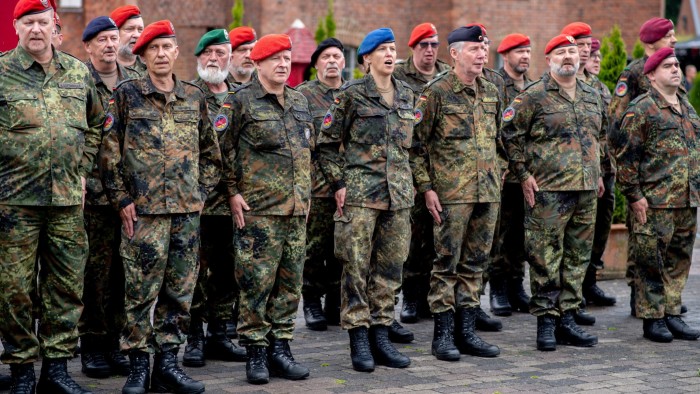Unlock the Editor’s Digest for free
Roula Khalaf, Editor of the FT, selects her favourite stories in this weekly newsletter.
Germany will bring back conscription to boost its armed forces if a plan to use volunteers fails to deliver enough recruits, the country’s defence minister has said.
Boris Pistorius said he would begin with a voluntary model to attract young people, supporting the Bundeswehr’s goal of more than doubling its reserve forces in response to Vladimir Putin’s full-scale invasion of Ukraine.
But he said Berlin would not shy away from a return to full conscription if the armed forces had spare training capacity — and would include such a provision in a bill that will be presented to parliament after the summer break.
“My goal is that the law contains two regulations,” he told German broadcaster ARD, referring to a voluntary option and a compulsory one. The latter, he said, would have to be activated “if the numbers are not sufficient”.
The fallback option would avoid a whole new legislative process if the voluntary enlistment numbers fall short. “We don’t have time for that,” he said. “If we have a mechanism that is already in place, then it won’t be a problem.”
Germany’s chancellor Friedrich Merz has said that he wants his country to have the “strongest conventional army in Europe”, vowing to play a greater role in the continent’s defence.
Merz scrapped Germany’s strict government debt rules to allow unlimited borrowing for defence spending after his victory in February’s parliamentary elections. He aims to overhaul the country’s long-neglected armed forces in response to fears of Russian aggression.
With money no longer a problem, the biggest issue confronting military planners is personnel shortages. Senior defence officials say that the armed forces must expand to include about 80,000 more professional soldiers over the next 10 years to meet Germany’s Nato commitments.
The country also needs to increase its number of active reservists who can be called upon in times of crisis, with the figure rising from about 60,000 today to 200,000 by the end of the decade.
Germany, where young people were compelled until 2011 to either do military service or a civilian alternative, has lost contact with many former conscripts who could serve as reservists due to data protection issues.
Pistorius told ARD that the situation was a “scandal” because “it means that in an emergency, ie if we were attacked, we could not call up our reservists because we don’t have their names or addresses”.
He said Germany was working to rebuild its reserves, starting with asking young people turning 18 to complete a survey about their willingness to do voluntary military training and then continue the commitment by being a part of the reserves. The scheme is expected to initially accept 5,000 people a year.
Senior figures in Merz’s Christian Democrats have criticised the plan. They argue Germany needs compulsory enlistment immediately to confront the security challenges facing Europe.
But Pistorius has said the military does not yet have the barracks and manpower to train hundreds of thousands of young conscripts each year.
Instead, he has insisted on following a voluntary model inspired by a similar system in Sweden. Germany would simultaneously build up its training facilities, he said, and would return to conscription if there was spare capacity.
At the same time, Pistorius said, the Bundeswehr would strive to recruit more professional soldiers to increase the standing army from about 183,000 people to about 260,000 by 2035 as part of its Nato targets.
“We have to do that by improving attractiveness, pay and other things,” he said.







